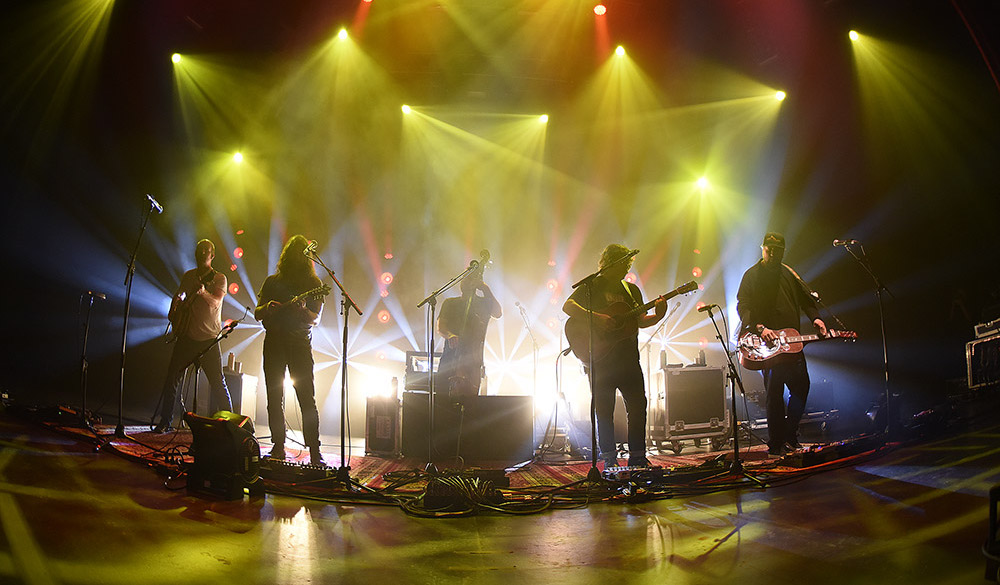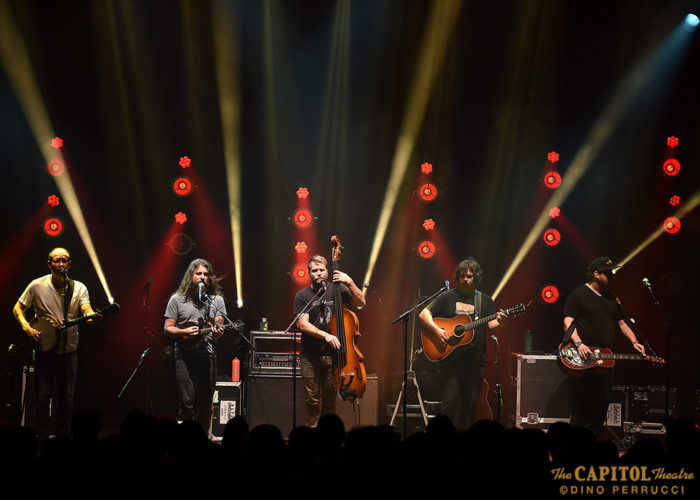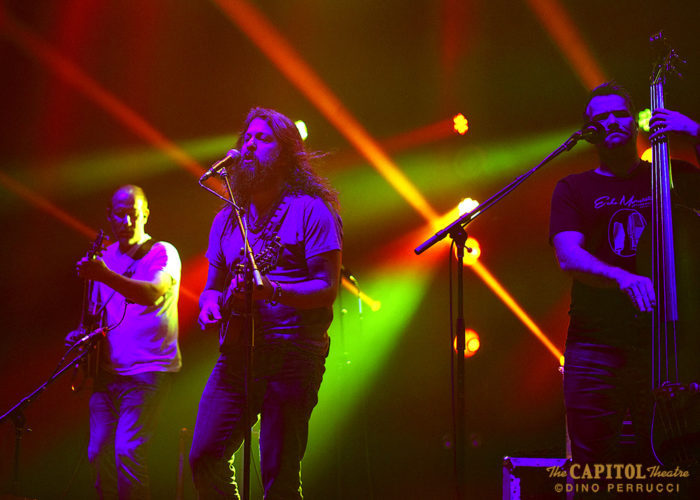Greensky Bluegrass: Courage for the Road

photo by Dino Perrucci
This article originally appears in the March 2019 issue of Relix. To get $5 off a new subscription to the magazine, use code GREENSKY19 here before April 15.
With a new album and an ever-growing fan base, Greensky Bluegrass have blossomed into one of the festival world’s biggest string bands by embracing some very electric, and eclectic, modern influences.
It’s a bitterly cold Saturday in January and Greensky Bluegrass are about to ascend to headliner status at Manhattan’s famed Beacon Theatre for one of the biggest shows of their career. As always, New Yorkers have countless musical options, both in and out of the improvisational music world, but there is no question that this sold-out engagement is the show of the night—from the familiar live music scenesters milling about the packed venue to a key opening spot by fellow buzz band Circles Around the Sun to a variety of pre-parties and post-shows timed with Greensky’s Beacon debut.
“We used to play the dumpiest little bars in New York City—this is so cool,” dobro player Anders Beck tells the enthusiastic crowd between songs later in the night.
Relaxing backstage earlier in the day, Beck and the other four members of Greensky Bluegrass—mandolinist Paul Hoffman, guitarist Dave Bruzza, banjoist Michael Arlen Bont and bassist Mike Devol—are acutely aware of their rising stature on the roots circuit and the weight of the space they are about to entertain. “I think it’s safe to say it has been a goal of ours to play this room,” Beck admits, sitting in the shadow of a large Allman Brothers mural.
The Beacon’s backstage areas are decorated with numerous Allman Brothers Band visages and, fittingly, Greensky opted to close their show with a lone “Midnight Rider” encore. The Southern jamband holds the record with 238 sold-out performances at the legendary NYC venue, and while Greensky’s sound skews away from the Allmans’ country-rock aesthetic, both bands embody a certain rebel spirit that blends deep trad-rock influences with a modern cool ethos.
Greensky Bluegrass may be one of the top touring acts in the string-music scene, but they’re definitely not your average bluegrass outfit.
“The cool thing about our show is, every venue we go to, we leave our own footprint,” Hoffman explains. “It becomes ours for the night. And it’s even more flattering when it’s these beautiful, legendary rooms like the Beacon.”
The members of Greensky are all passionate music fans who came of age seeing jamband and bluegrass music, adding an extra sense of pride to their recent concert conquests. They sold out the Ryman Auditorium, which they colloquially refer to as “The Mother Church of Country Music,” in 2016 and returned this year for a victory lap. In the tradition of bands like Yonder Mountain String Band and Leftover Salmon, Greensky Bluegrass gladly defy the genre’s usual restrictions. Effects pedals and indie-rock influences are all fair game, and their dedicated legion of fans love them for it.
According to Devol, even bluegrass royalty like the McCourys were happy to see the five-piece shake things up. “They’re starting to see that bands like us are carrying the torch in a way that maybe some young, more traditional bands can’t. We’re reaching a lot of people. We know Del personally, and the McCoury family, and we’ve definitely gotten their seal of approval,” he explains.
“But we’re not that new or special on many levels,” Beck adds with a laugh. “All those older guys have been friends with Leftover Salmon and Yonder Mountain String Band and The String Cheese Incident for a long, long time.”
On their seventh studio album, All for Money, Greensky push the musical envelope even further, bringing their onstage impulses into the studio for the first time and taking inspiration from unlikely sources like Jack White and Arcade Fire. (The quintet even enlisted White collaborator Dominic John Davis to helm their new release alongside standby producer Glenn Brown.)
“Previously, a lot of the time, we would sort of imply that there was going to be a jam in a song on the record,” Beck explains. “But on this album, it’s like ‘Fuck it; let’s go for it. Let’s not imply a jam; let’s jam!’”
“It’s already translating to the stage better. Like we designed a sports car specifically for racing,” Hoffman adds.
 Bringing yesterday’s sound into tomorrow: Michael Bont, Paul Hoffman, Mike Devol, Dave Bruzza, Anders Beck (l-r)
Bringing yesterday’s sound into tomorrow: Michael Bont, Paul Hoffman, Mike Devol, Dave Bruzza, Anders Beck (l-r)
Beck points to the title track, “All for Money,” as his personal favorite and the album’s “opus” centerpiece. Starting as straight-forward bluegrass, it turns into a web of cosmic psychedelia and then segues into what the band calls a “triumph section.” By the end of its seven-plus minutes (maybe more if you’re seeing it live) it manages to find its way back to earth, cradled in the safety net of that original bluegrass motif.
“It still scares me when I listen to it, because we might have gone too far,” Beck sighs, describing “All for Money” in amazement. “And I’m usually the one who wants it to go too far! The space jam in the middle of that song…I’m almost concerned that it’s too weird. Which is awesome! I’m so excited that I’m concerned about it!”
Later, sitting in a small dressing room a few stories above the Beacon’s main stage, Hoffman expands on the song’s lyrics. He leans back with his hands interlaced, each adorned with an antique ring. (The one on his right hand showcases a beautiful blue and green stone; he humorously admits that it reminds him of the band’s moniker.) As Greensky Bluegrass’ primary lyricist, Hoffman usually prefers to keep his cards close to his chest when discussing his songs. Explicitly stating the motivation or inspiration for his lyrics can sometimes rob people of their own interpretations. With “All for Money,” however, he found himself writing transparently about the band’s meteoric rise. After all, it’s hard to take lyrics like, “How could the top feel so empty?/ Get to the point; nothing left but to fall,” any other way.
“This thing started to happen with the band. For all these years, it was all about winning over the fans. Then, all of a sudden, we won them all over. And now it’s about appeasing them,” he says. “It’s a lot harder to meet someone’s expectations than it is to win them over when they have none. It’s intense. We have these people that come to all these shows, and we care a lot about keeping it relevant and keeping it special for these people. This fan is here for the fifth night in a row; now what do we do? We challenge ourselves to take risks. I realize that writing a song about this is tricky because I didn’t want to patronize people for liking us. That’s counterintuitive… ‘All for Money’ is really about the band’s relationship with the fans and our relationship with the band as a job.”
If you were to retrace the Greensky Bluegrass origin story, then the word “job” was never in their mission statement. In 2000, when a 19-year-old Hoffman approached 20-year-old Bruzza and 23-year-old Bont at an open mic in Kalamazoo, Mich., the three young musicians were far from virtuosos. According to Bruzza, all Hoffman said was “I have a mandolin” and he was in the band.
“The next day, Paul came down to Mike’s house and we learned some songs together. We were all new to our instruments and we were all exploring and learning about bluegrass,” Bruzza recalls.
Early on the musicians would play open mics in exchange for cases of beer; a Halloween party in 2000 marked the first time they flew under the Greensky Bluegrass name. (For the record, Bruzza was dressed in drag, Bont was a tiger and Hoffman was an unconvincing Jack Kerouac.)
“We called ourselves [Greensky Bluegrass] just because it was funny. It was a joke,” Bruzza says. “It was never an intention to do what we’re doing today. Over the years, it turned into that when we realized more and more people were interested in what we were doing.”
The young group honed their skills during a weekly gig at Bell’s Brewery in Kalamazoo, and scored their big break after taking an impromptu drive to Colorado in 2006, hoping to land a spot on the Telluride Bluegrass Festival. They had already competed in the festival’s annual search for undiscovered talent in 2004 to no avail, but after a few early lineup changes and with the addition of Devol on upright bass, this time Greensky Bluegrass won a coveted slot on the Telluride lineup. It was a résumé booster that opened doors across the country and put them one step closer to playing bigger gigs and scheduling longer tours.

Meanwhile, Beck was working the local scene in Durango, Colo., trying to find new bandmates after the members of his group Wayword Sons decided to stop touring.
“At that point, it was, ‘Well, I will either get a real job or try and find a band that wants to incessantly tour and try and make it,’” Beck recalls. Unwilling to give up on his musical aspirations, he made a list of bands that he would approach, and Greensky was near the top.
“I believed in these guys,” he says of his motivation to join the rising jamgrass outfit. “I believed in the songwriting. I thought they were cool, and we could hang out for 300 days a year together.”
After meeting the quartet at festivals and casually playing together as friends, Beck officially joined the band in the fall of 2007, solidifying the current lineup. Since then, Beck proudly notes, Greensky Bluegrass has only gotten “weirder and weirder.”
And despite being the last musician to join the band’s roster, Beck and his wailing dobro have become pillars of GSBG’s signature sound.
“All of my goals and dreams and desires for what I want to do with music have been far and away achieved,” Beck says, looking back on his tenure with the band. “We’re playing three nights at Red Rocks. Who the hell do we think we are? We’re the luckiest people in the world. I couldn’t wish for anything more. I’m playing dobro at the Beacon. It’s just an instrument that I picked up and started fucking around on. And it’s led to this.”
The band’s three-night Red Rocks run also affords them the chance to encourage the next generation of bluegrass and country experimentalists. This year, Greensky Bluegrass have tapped fellow roots-influenced rising stars Billy Strings, The Lil Smokies and Rayland Baxter as their support acts for the multi-night run.
“Some of those guys used to tell us about coming to Greensky shows when they were in high school,” Devol adds with a chuckle.
It’s still a surprise when they see Greensky’s influence ripple through the live-music scene. Last year, they even held their first annual Camp Greensky festival, with sit-ins and sets by marquee acts like Marco Benevento and Phish’s Mike Gordon.
Hoffman grins when asked about how the “Camp Greensky” name came about. “It’s hokey, but we’re kind of hokey,” he says. Camp Greensky, he explains, was what the band called their festival campground before they worked their way up to tour buses and hotels. “Yeah, we’re dark and psychedelic, but we’re also circus-y and silly, and we make dumb jokes and we embarrass ourselves for other people’s entertainment.”
And as they release a landmark LP that encompasses their sought-after live shows, the band’s ever-growing network of fans—who call themselves Campers—pore over setlists and travel across the country to see multiple shows in a row. The official Camp Greensky Facebook group contains over 15,000 die-hard fans, and over 450,000 people listen to Greensky Bluegrass on Spotify per month. In short, Greensky Bluegrass defy what it means to be a bluegrass band yet still, somehow, are one of the defining bluegrass bands in America.
“We’ve seen it become something much bigger than us. It’s pretty moving. We couldn’t create that. They had to create that,” Devol says sincerely.
“Things have changed significantly over the years,” Beck adds, surveying the band’s success. “I think I’ve tended to not think about the growth or the size of the room: the Beacon or the way our fans are. Because then I can just focus on playing music. But when I actually stop and think about it, it’s insane. What we’re doing with five instruments is pretty special. There’s 2,500 people in a room and I can look around at familiar faces in the crowd every night.”
This article originally appears in the January/February 2019 issue of Relix. For more features, interviews, album reviews and more, subscribe here.



















